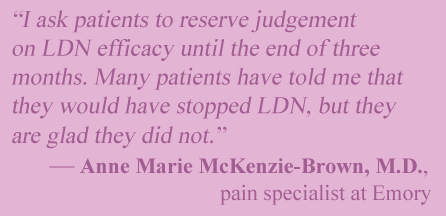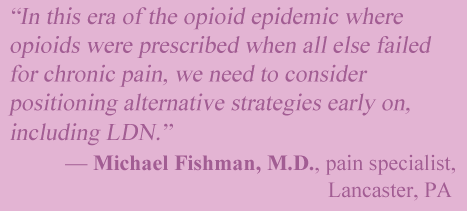Treatment & Research News
Giving LDN Your Best Shot
…How-To Guide for Fibromyalgia
Home | Treatment & Research News

Need a roadmap on how to test drive low-dose naltrexone (LDN) for fibromyalgia? This article offers navigation advice from four experts to minimize the bumpy road ahead. If you have not heard of low dose naltrexone, check the trial funded by AFSA. Basically, LDN works to quiet the immune cells in the central nervous system (the microglia) that are magnifying your symptoms. The side effects of LDN are mild. Unlike all drugs that target the neuros, LDN does not cause a slew of side effects in fibromyalgia patients.
Success Rate
What are the odds that LDN benefits you? Sean Mackey, M.D., Ph.D., a pain specialist at Stanford University in Palo Alto, CA, was one of the investigators on AFSA’s LDN trial. He found that three out of ten patients achieved at least a 30 percent improvement in pain.1 The drug produced similar benefits in fatigue and sleep, but the study included only 30 people.
Nicholas Aitcheson, M.D., a rehabilitation and pain specialist in Queensland, Australia, says, “Around 200 patients have tried LDN for fibromyalgia in our chronic pain clinic. Anecdotally, one-third reaped significant positive results in pain reduction and improved function.” Reports by other pain clinics involving anywhere from ten to 70 fibromyalgia patients give similar findings.
Symptoms LDN Treats
Aside from pain, LDN helps with cognition (reduces brain fog), sleep, mood, and fatigue. “Fatigue is a major complaint for people with fibromyalgia,” says Mackey, and it’s difficult to find anything to alleviate this symptom. Pain specialist Michael Fishman, M.D., of Lancaster, PA, adds that LDN also reduces postural hypertension (lightheadedness upon standing) and burning symptoms. While not every patient has these problems, they are tough to treat.
“When choosing patients for a prescription of LDN, I like to ensure that they have fibromyalgia and not just pain in a few areas,” says Aitcheson. “The presence of other symptoms like cognitive clouding, fatigue and unrefreshing sleep shifts me toward the use of LDN.”
Must Be Compounded
LDN works as well, if not better, than other drugs to treat fibromyalgia. Unfortunately, your local pharmacy only dispenses 50 mg tablets of naltrexone. To get the tiny dose needed, you must go through a compound pharmacy. Insurance companies won’t pick up the tab, but the cost of LDN is $1/day … and possibly as low as 57 cents/day.
“Some patients and physicians are nervous when using a medication that needs to be compounded,” says Aitcheson. To ease concerns, he points out, “Naltrexone has been used safely for at least 40 years, and we are prescribing it at less than one tenth of the minimal normal dose.”

Working with a naltrexone compounding pharmacy presents hurdles for patients and physicians (both cost and inconvenience). However, Anne Marie McKenzie-Brown, M.D., a pain specialist at Emory University in Atlanta, GA, offers advice in our article on Compounding Pharmacies.
Dosing LDN for Fibromyalgia
The most common dose of LDN is 4.5 mg/day, but the range is from 1.5 to 9 mg.2 Just like all medications, one dose doesn’t work for everyone. Fibromyalgia patients usually take naltrexone as a single dose at night because if side effects occur, they won’t impact morning function.
“I just recommend that patients start at 4.5 mg LDN at night,” says Mackey. “I don’t think that there is anything magical about that dose.” This was the dose used in the fibromyalgia trial, and it happens to be the average dose patients end up taking.
According to Fishman, “If nightmares or vivid dreams are present, they improve with taking LDN in the morning instead of at night.” Other side effects, such as headaches, nausea and anxiety are mild and occur infrequently. However, if they persist, you can drop down to a 3 mg dose and these side effects will usually go away.
If you are drug sensitive, other dosing schedules may be used. “I start patients at 1.5 mg/day for the first week, increase it to 3 mg/day the second week, and move patients to a stable dose of 4.5 mg/day the third week,” says Aitcheson. He prescribes 1.5 mg compounded capsules during the titration phase.
McKenzie-Brown uses a similar titration schedule, but instead of capsules, she prescribes 3 mg tablets that are scored. This form of LDN is available from a few mail-order pharmacies. “I start with 3 mg tablets and ask patients to cut them in half for one to two weeks to make sure there are no side effects. Then they go to 3 mg. If they have relief and want to stay at 3 mg, we stay at this dose. Otherwise, I have patients increase to 4.5 mg. Many patients stay at 3 mg.”
Be Patient
Low dose naltrexone is not a fast-acting treatment. Patients in the LDN trial for fibromyalgia trial took a month to notice improvements. Both Aitcheson and McKenzie-Brown recommend being on LDN at 4.5 mg/day for three months before giving up. In fact, McKenzie-Brown published a study on the use of LDN at her chronic pain clinic.3 She noticed 12 percent of patients don’t get pain relief until after three months.
“I ask patients to reserve judgement on LDN efficacy until the end of three months,” says McKenzie-Brown. “Many patients have told me that they would have stopped LDN, but they are glad they did not.”
Complimentary Therapies
Getting a handle on fibromyalgia requires a combination of therapies, so don’t view LDN as your only option. “I usually prescribe LDN as an add-on to other medications,” says Aitcheson. He recommends magnesium and duloxetine along with LDN. “These agents act on the pain amplification pathways in the brain and spinal cord.”
McKenzie-Brown refers patients to physical therapy, aquatic therapy, and acupuncture, in addition to prescribing nonopioid medications. The point is you don’t have to wait for LDN to work to get relief from your fibromyalgia.
Increasing the Dose
If LDN is reducing your symptoms, it’s natural to wonder if a higher dose might be better. “I take it on a case-by-case basis,” says Mackey, adding “there aren’t any guidelines to direct us in this phase.”
“For the vast majority of people,” says Aitcheson, “going above 6-8 mg per day is not likely to be worth it.” Trying a higher dose requires a new script, so talk it over with your physician at a follow-up visit.
Will LDN Stop Working?
It’s possible, but physicians seldom encounter patients who develop tolerance to low doses of naltrexone.
Drugs that target the neurons (particularly the receptors that produce transmitters) often lead to tolerance. Returning the microglia to their normal resting state should not cause tolerance, but no one knows for sure.
“Lifestyle measures (exercise, sleep, diet, etc.) must be put in place when the effect of LDN is good,” says Aitcheson. “This strengthens people’s reserve, so if LDN stops working, it won’t be so devastating.” He also points out that patients may not be experiencing a loss of LDN efficacy, but rather a fibromyalgia symptom flare.
LDN and Opioids
Naltrexone blocks the action of opioids, so should you abstain from taking this class of meds while trying LDN? Maybe not if you are only taking an opioid on an intermittent basis during the day and you take the LDN at night.

“One of two things may happen,” says Mackey. “Patients may not notice any difference in the opioid’s effectiveness, or they may experience a reduced benefit of the opioid due to the LDN.” If you are on an opioid, Aitcheson adds, “Expect more gastrointestinal side effects for the first few weeks of LDN.”
Whether you take an opioid on bad days or are on tramadol (a weak opioid), Fishman still recommends LDN. However, his standard dosing schedule is to start at 1 mg and increase 0.5 mg per week until 4.5 mg/day is reached. If a person is on an around-the-clock opioid, very low-dose naltrexone (0.5 mg or less) may be used as the starting point.
“In this era of the opioid epidemic where opioids were prescribed when all else failed for chronic pain,” says Fishman, “we need to consider positioning alternative strategies early on, including LDN.”4
Stay Current on Treatments & Research News: Sign up for a Free Membership today!
Learn your LDN compounding options and costs.
Symptoms | Medications | Alternative Therapies | Muscle Pain Relief | Fibro Friendly Exercises
LDN for Fibromyalgia References
If your doctor is hesitant to prescribe LDN for your fibromyalgia, here’s a great article: Aitcheson N, et al. Aust J Gen Pract. 2023. Low-dose naltrexone in the treatment of fibromyalgia: A systematic review and narrative synthesis 52(4):189-195. Free Report
- Younger J, Mackey S, et al. Arthritis Rheum 65(2):529-538, 2013. Report (free to read)
- Bruun-Plesner K, et al. Pain Med 21(10):2253-61, 2020. Report
- McKenzie-Brown AM, et al. J Pain Res 16:1993-1998, 2023. Free Report
- Kim PS, Fishman MA. Curr Pain Headache Rep 24:64, 2020. Abstract
